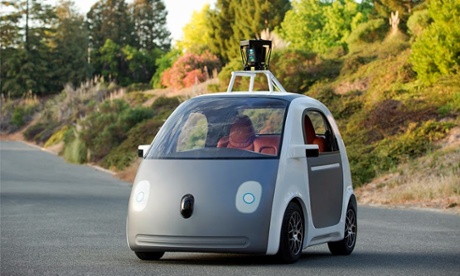You don't even need to Google that one. The dogs in the street know the usual excuse given after a couple of motorized vehicles come together in ways not intended by the manufacturer.
So when you read about the driverless Google cars being involved in numerous collisions, you won't be at all surprised that Google is saying its car did not cause all those collisions.
 |
| Where is there room for a backseat driver? |
According to Chris Urmson's post on the Google-mobile, it's the drivers in traditional modes of transportation who cause the accidents by striking the Google car from the rear at places where cars are supposed to come to a complete halt. Like those intersections where signs are posted, stating "Stop". Sometimes drivers are so distracted by their morning coffee or a cat video on their smartphone that they don't notice the driverless car in front of them obeying all traffic regulations and actually stopping.
If you are in the lead car in that sort of situation, you might have a split second available to move your own car forward and avoid a collision from the rear. Time things right and the fool trailing behind you, the one who doesn't know what "Stop" means, is more likely to get T-boned by the car that is driven by someone who thought it was their turn to proceed through the intersection. But it won't be your car getting damaged, so there's a small glimmer of good news for you.
The driverless car cannot react to abrupt changes in human behavior that defy expectations of a computer programme.
And there you have the best reason given for developing the driverless car. People make mistakes. Stupid, dangerous mistakes. They get distracted. God help us but they get drunk and think they're fine before turning the key in the ignition and heading for home.
Human eyes do not see all that well in the dark, which results in people, especially the older set, entering motorways on the wrong side.
It's a problem with tourists of any age who cannot seem to fully accept that the Irish and English drive on the left side of the road, so when you're out motoring around the Ring of Kerry and the road narrows, you don't want to veer right to avoid that farmer barreling towards you.
Technology could save lives, at least in Mr. Urmson's opinion. He's involved in developing the driverless car, so he'd say that of course.
All those accidents? Those were the fault of the other drivers. His machine doesn't do foolish things or make mistakes that leave the other driver wondering if the person who smashed into them is brain-dead or high.
But what happens if this technology gets adopted and we still have collisions? We'll be blaming the other computer for crashing, I suppose.
No comments:
Post a Comment